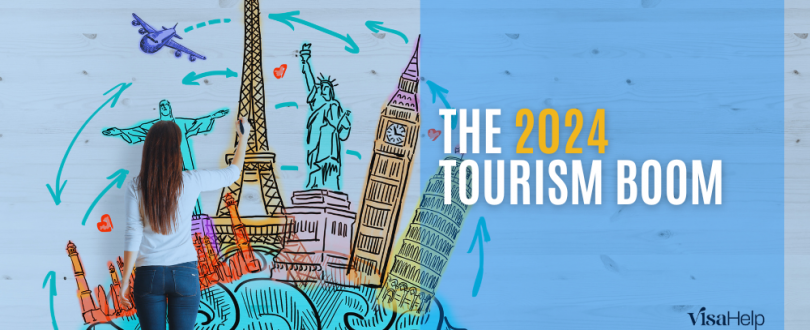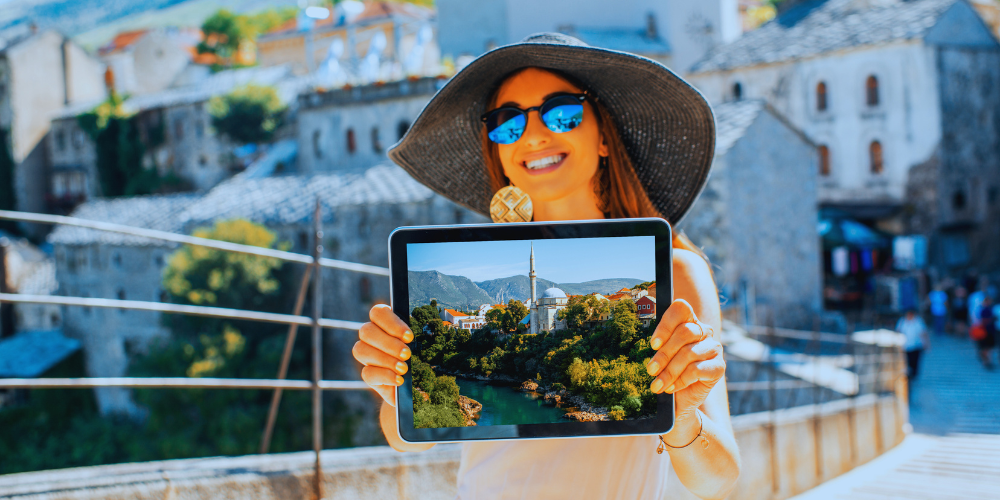
As we stand on the brink of 2024, the travel and tourism sector is poised to reach an unprecedented milestone, with projections setting the industry’s value at a staggering $11.1 trillion. This remarkable growth story is not just a testament to our collective wanderlust but also a crucial driver of global economic progress. Let’s embark on an explorative journey to understand what this means for us as travelers.
The Surge of Global Tourism Growth
The unprecedented growth in global tourism marks a new era for travelers and destinations alike. This surge is driven by a multitude of factors including increased global connectivity, more affordable travel options, and a growing middle class with disposable income for leisure travel.
Destinations once considered remote are now within reach, thanks to improved transportation and the growing accessibility of travel information. This democratization of travel is not only a cultural phenomenon but also an economic catalyst, driving development in regions previously untouched by tourism.
Economic Impact of the Travel Boom
The economic implications of this boom are colossal. Travel and tourism now account for a significant portion of global GDP, providing jobs, spurring infrastructure development, and injecting capital into local economies.
The industry’s multiplier effect is profound – each dollar spent on travel can lead to several more indirect economic contributions. From local artisans to multinational hotel chains, the influx of tourists translates into a steady income stream that supports a wide array of services and sectors.

Embracing Sustainable Tourism
With growth comes responsibility. The sector is increasingly focusing on sustainable tourism to mitigate environmental impact and promote social equity. This includes eco-friendly practices in hospitality, preservation of natural and cultural heritage, and ensuring that tourism benefits local communities.
Travelers today are more conscious of their ecological footprint and seek experiences that align with these values. As a result, destinations and businesses are adapting to offer more sustainable options, from green accommodations to community-based tourism initiatives.
Digital Revolution in Travel & Tourism
Technology is reshaping the travel experience at every step. Online booking platforms, mobile apps, and digital guides have made trip planning more convenient than ever. Artificial Intelligence (AI) and Virtual Reality (VR) are providing immersive preview experiences, while Big Data analytics help businesses tailor offerings to individual traveler preferences.
This digital transformation extends to on-trip experiences too, with augmented reality (AR) apps offering interactive tours and smart hotel rooms enhancing guest stays with personalized, high-tech conveniences.
Navigating Post-Pandemic Challenges and Opportunities
The COVID-19 pandemic posed unprecedented challenges to the travel sector, but it also accelerated many positive changes. The industry’s resilience has been remarkable, pivoting towards new standards in health and safety, flexible booking policies, and innovative travel formats like ‘workstations’.
As borders reopen, there’s a renewed focus on sustainable, responsible tourism. The pandemic has also highlighted the importance of local travel and the need to diversify tourism offerings to reduce over-reliance on international visitors.
Investment in Tourism Infrastructure
Investment in tourism infrastructure is a critical component fueling the sector’s growth. Governments and private entities are pouring funds into developing airports, transportation networks, accommodations, and recreational facilities to cater to the increasing influx of tourists.
This development is not just about scaling up capacity; it’s about enhancing the quality of travel experiences. Modern, efficient, and sustainable infrastructure is pivotal in attracting tourists, particularly in emerging destinations. Such investments also spur local economies, creating jobs and fostering regional development. The focus is increasingly on sustainable infrastructure, ensuring that development meets today’s needs without compromising future generations.
The Rise of Cultural and Heritage Tourism
Cultural and heritage tourism is experiencing a renaissance, as travelers seek more meaningful and authentic experiences. This form of tourism allows visitors to immerse themselves in the history, traditions, and arts of the places they visit. It’s not just about sightseeing; it’s about engaging with the local community, understanding their way of life, and appreciating their cultural heritage.
Governments and tourism boards are recognizing the value of their cultural assets and are investing in the preservation and promotion of these sites. This not only helps to conserve cultural heritage but also provides an economic boost to local communities through tourism.
Ecotourism: A Responsible Way to Travel
Ecotourism has emerged as a vital component of the tourism industry, driven by a growing global consciousness about environmental conservation and sustainable living. It focuses on responsible travel to natural areas, conserving the environment, and improving the well-being of local people.
Ecotourism offers an alternative to traditional tourism, emphasizing smaller groups, minimal environmental impact, and often, educational components to raise awareness about conservation efforts. It supports the protection of natural habitats and endangered species while providing travelers with unique and low-impact nature-based experiences. Ecotourism also empowers local communities through employment opportunities and involvement in sustainable tourism development.

Changing Travel Policies and Regulations
The landscape of travel policies and regulations is constantly evolving, influenced by global events, technological advancements, and shifting political climates. Travelers today need to navigate a complex web of visa requirements, health regulations, and safety advisories. The digitalization of travel documentation, including e-visas and electronic passports, is streamlining these processes, making cross-border travel more seamless.
However, in the wake of events like the COVID-19 pandemic, there’s an increased emphasis on health security and preparedness. Travelers must stay informed about these changing policies to ensure compliance and smooth travel experiences. It’s also essential to understand how these regulations impact the rights and responsibilities of travelers, ensuring a safe and respectful global travel environment.
Trends in the Hospitality Industry
The hospitality industry is undergoing rapid transformation, adapting to changing consumer preferences and technological advancements. One of the most notable trends is the integration of technology to enhance guest experiences. This includes smart room technology, where guests can control everything from lighting to room temperature through their smartphones, and AI-powered chatbots providing 24/7 customer service.
Additionally, there’s a growing emphasis on personalized experiences. Hotels are using data analytics to tailor their services to individual guest preferences, from customizing room amenities to offering personalized travel recommendations. Sustainability is also a key focus, with more hotels adopting eco-friendly practices, such as using renewable energy sources and reducing waste.
Understanding Travel Demographics
Today’s travel landscape is incredibly diverse, with varying preferences across different age groups, incomes, and cultures. Millennials and Gen Z travelers are looking for unique, Instagram-worthy experiences and prioritize sustainability and local experiences.
Family travelers seek destinations that offer activities for all ages, while solo travelers are often in search of personal growth and adventure. Understanding these demographics allows travel providers to tailor their offerings more effectively. For example, offering adventure activities for younger travelers or ensuring family-friendly amenities and accommodations for those traveling with children.
Destination Marketing in the Digital Age
Digital marketing has revolutionized the way destinations promote themselves. In an era dominated by social media, a robust online presence is crucial. Tourism boards and businesses are leveraging platforms like Instagram, TikTok, and Facebook to showcase their destinations through stunning visuals and engaging content. Influencer partnerships are also a significant trend, as they offer authentic storytelling and reach a dedicated audience. Additionally, destinations are using data analytics to understand traveler preferences and tailor their marketing strategies accordingly. The digital age also brings opportunities for interactive and immersive marketing, such as virtual tours, which allow potential travelers to experience a destination before they even book their trip.
Luxury and Adventure Travel: Niche Markets with Big Potential
Luxury and adventure travel are niche sectors that present significant growth opportunities. Luxury travel is evolving beyond just opulence; today’s luxury travelers seek exclusive, bespoke experiences that offer privacy, customization, and exceptional service. This includes private villas, secluded retreats, and unique experiences like private yacht tours or dinner cooked by a Michelin-starred chef.
Adventure travel, on the other hand, appeals to those seeking physical activity, cultural immersion, and nature exploration. This sector caters to a range of activities from hiking and biking in remote destinations to wildlife safaris and extreme sports. Both sectors are seeing growth as travelers look for more than just a standard vacation – they want experiences that resonate with their interests and lifestyles.
As the travel and tourism sector scales new heights, your journey as a traveler is set to become more exciting, diverse, and enriching. And when it comes to ensuring a hassle-free experience, especially with visa applications, GovAssist steps in as your reliable partner. With their expertise in navigating complex visa processes, VisaHelp ensures that your focus remains on the joy of travel, while they take care of the intricacies of your travel documentation. In a world that’s more connected than ever, the future of travel is bright, and your next adventure is just around the corner.

